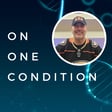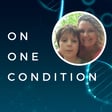Become a Creator today!Start creating today - Share your story with the world!
Start for free
00:00:00
00:00:01

Episode 46: Mike Davies - Eczema
Mike discusses his lifelong battle with eczema and recent struggles with suspected topical steroid withdrawal (TSW). After being prescribed steroid creams in 2021, Mike found that using it months apart worsened his flare-ups. Eventually, he stopped using the creams, which led to severe symptoms affecting his entire body. Mike shares the physical and emotional challenges of living with eczema, and the importance of self-advocacy and alternative approaches to treatment. Through his voice, he hopes others will consider ways of managing eczema before moving on to treatments such as steroid creams.
The song that Mike selected is Everybody breaks by Ivan and Alyosha.
Transcript
Introduction to 'On One Condition' Podcast
00:00:00
Speaker
Hi, I'm Sylvain Bertolo, and you're listening to On One Condition, a podcast to raise awareness about health conditions by listening to people who leave them every day. My guest today is Mac Davies, and we're going to talk about eczema and a suspected topical steroid withdrawal. Hi, Mike. Thanks for joining me on the podcast. How are you doing? Hi, Sylvain. Thanks so much for having me. some so It's a lovely day here in London. and but I'm doing pretty well, thank you. Yes, and it's a nice day where I am as well. So for our listeners, it's September, it feels like summer is finally reaching us.
Personal Reflection Through Music
00:00:44
Speaker
So I love starting with a song. So could you tell us which song you chose and why, please? Yeah, certainly. So the song I've chosen is called Everybody Breaks by Ivan and
00:01:00
Speaker
i know yoha I'm not exactly sure how to pronounce it, but yeah, that's the song. And, uh, it's sort of, you know, might sound a bit of a cliche title. Everybody breaks, but yeah, the reason I've i've gone for that is just because I particularly find that that reminder is quite useful. I, I often get in my head about, um, you know, you know, the way that I'm feeling and it can feel like you know I'm the only person who's ever suffered with any kind of issues, health issues, but then you know that reminded to me that everyone goes through something at some point. and Everyone has their the issues. I find it really useful.
00:01:48
Speaker
Yeah, I don't know the song so I can't comment on it but I'll go and have a listen. It's nice, it's sort of un-themic, you can really blast it out in the shower or in the car.
00:01:59
Speaker
Okay, great. Thank you. I love discovering music this way.
Isolation in Misunderstood Conditions
00:02:05
Speaker
You've already said something that makes me want to ask you a question that I wasn't thinking of to start with, but do you feel isolated? Like you mentioned a reminder that you're not the only one going through through those sort of things. Yeah, I think certainly everyone must feel if they, you know, having health issues that it's easy to feel like, you know, you're the only person who's going through it. I think especially in the case of eczema and topical steroid withdrawal that we're talking about today, some of these conditions aren't necessarily that well understood and often aren't that well understood even even by the medical industry. And so I can feel extra isolating.
00:02:59
Speaker
yeah Yeah. Yes, and that's a topic we talk about a lot actually. The the the the the healthcare industry not necessarily always Knowing or understanding conditions is a challenge for a lot of people who who come on the podcast.
Eczema Journey and Initial Treatments
00:03:22
Speaker
So let's let's go to the the beginning then for you. When ah were you aware that you have eczema and did you go for ah like a diagnosis?
00:03:36
Speaker
Yeah. So yeah, I guess what we're talking about is is is mainly eczema, atopic dermatitis and also a little bit of and topical steroid withdrawal. So I've always had eczema. That's something that I was born with. Yeah. It's a sort of chronic condition, which there is isn't a cure for, but it's never really, thankfully it's never really affected my life too badly.
00:04:00
Speaker
I've had patches of of of dry skin and flare ups of itchiness throughout my life, which have come and gone. and But it's never really had a major impact on my life growing up or in my young young life. And then what happened was around 2021, I must have had, I can't remember exactly, but I must have had a particularly bad flare up of eczema or dry skin. I think it was on my arms. It was you know it the usual thing where it's Common places are the the folds of your elbows and the backs of your knees. It's very common ah for people to get dry skin there, and and that's what eczema is.
Misuse and Dependence on Steroids
00:04:43
Speaker
So I think in around 2021, I must have had a particularly bad flare-up, and I went to the GP, and
00:04:51
Speaker
I got prescribed some steroid cream, which is, which was slightly stronger. I think it's a moderate strength on the, so steroid creams are ranked on, on strength. okay And you can get a ah low, you can get a very so low strength, steroid cream, hydrocortisone over the counter in most pharmacies.
00:05:15
Speaker
And I had used that before, but when I went to the GP, I was prescribed moderate strength steroid cream. They gave me quite, quite a lot of it, quite a large amount of it. And I use that. And the advice always with steroid cream is you can't use it for very long, you know, a week or two weeks max, and then you have to stop using it. But that advice wasn't super clear to me at the time and I guess what I would do is use it for but use it for the time, use it for two weeks. It would work to clear up the flower up of eczema. And then I'd stop using it as directed, and eventually the flower might return. And so because I had so so much of this cream, I thought, well, I'll just but use it again for two more weeks.
00:06:08
Speaker
So I would do that and it would work. It would kill the flare up. The skin would improve and stop using it. But what began to happen is that that gap between flare ups and using the cream was getting shorter and shorter. So initially I might have used it for two weeks and then taken like six months off and then had to use it again for two more weeks.
00:06:32
Speaker
But over the course of about five years, yeah that that gap shrank. I was starting to use it more and more frequently. And sometimes it'd just be it'd be like two weeks and then a few days off. And by the end, I was i was using it constantly. And i couldn't I couldn't get the flare up to to stop in the in the time. And so after two weeks, the flare up was still going. The cream wasn't working. And I'd just continue using it because I didn't know what else to do. and you know looking back, at it's it's obvious really that I should have gone back to the GP and and sought some more advice at that point, but I was just trying to manage it on my own.
Lack of GP Guidance
00:07:13
Speaker
This is what leads then into the the topical steroid withdrawal piece. Yeah. So do is it that you didn't get the right recommendations from your GP or that the like the cream, whatever you the label says wasn't really explained very well?
00:07:32
Speaker
I mean, obviously, I'm responsible and I, you know, you are responsible for your own health, you you need to look after yourself, go to the GP. And at some point during that five year period, I should have realised that I was, you know, outside of the the scope of the aquarium and I'd gone back for for a second opinion. But I also do think that I was let down somewhat in the fact that I was given so much of the cream. you know if if If I'm only going to be using it for two weeks, the amount of cream I had lasted me for five years. So and something something went wrong there. And also, I wasn't i wasn't fully aware of the risks of storied cream. It wasn't really made clear. The only thing that I knew at the time was that you should just use it for two weeks. And I i also didn't know that that meant
00:08:23
Speaker
use it for two weeks and then never use it again or, you know, use it for two weeks and then go back to the GP if it's not worked. But I assumed it meant use it for two weeks whenever you need to use it.
00:08:34
Speaker
Yeah. Yeah. Yeah. And six months is is long. You wouldn't expect it to have an effect and like that. And is it something that, so now you you're, you've gone through it. Do you know if it's that you should just use it for two weeks and then stop completely?
00:08:58
Speaker
I believe that steroid starrow creams are safe and they've been used for a very long time and they're very effective. So I believe if used correctly, steroid creams are safe. I think it's just that the key part of it is you have to be very careful. You have to be aware of the the strength of the steroid cream that you're using. yeah um you have to You have to be careful with how you use it. And I think you need to make sure that you are If you're on anything that's beyond over the counter steroid cream, you need to be a bit more proactive with your GP or dermatologist and make sure that you're using it exactly as directed, basically. Yeah. yeah Okay. And were you follow followed by a dermatologist at the time?
00:09:47
Speaker
No, and I guess that's another point of you know improvement is after I saw the GP and she gave me all this this cream, i didn't hear I didn't hear back at all. I was i was never folded up with hi the GP or or anyone after that. So I was basically sent away with what ended up being five years worth of steroid cream and and you know no up.
Cold Turkey on Steroids and Community Discovery
00:10:15
Speaker
Yeah. So how is it now? Is it more under control or do you still have more eczema than what you used to have before using the steroid cream? Well, so to kind of continue the timeline from where we left off. So the steroid cream had been working, had been keeping the flares under control, but the the gap between the flares, it had become shorter and shorter.
00:10:43
Speaker
And eventually it got to the stage at the start of 2023, where I was using it constantly and it wasn't controlling the eczema that the skin was was still, you know, really red, really itchy, breaking out all the time. I was using the cream constantly, but it just wasn't under control. So, and it was at this point as well, which I was starting to do a bit more of my own research and I was finding out about topical steroid withdrawal as a concept.
00:11:10
Speaker
And I decided to just go cold turkey and stop using steroid cream because I kind of got a bit freaked out. when you When you start researching and you hear about steroid withdrawal, it's quite a scary concept. Okay. So yeah, so the idea of of steroid withdrawal is the fact that yeah your body can become dependent on the steroid cream. And when you stop, it leads to a bigger flare up.
00:11:40
Speaker
um of the eczema than you had before you started. It's still like early days and isn't isn't fully understood. It's not really an official sort of diagnosis. It's still being researched and sort of being communicated about out to doctors, but it seems to be something that's gathering a lot of interest in people who seem to be experiencing the same kinds of things where they've they've used steroids, they perhaps have overused the steroids and when they stop, their skin goes case crazy. Okay. so So you're not the only one in this situation then. And when you say that it's being looked into by doctors, is it in the UK specifically or is it something that is more verbal, do you know?
00:12:31
Speaker
It's worldwide, as far as us know. There's a few sort of main figures in the in the space. but And there's a few sort of different treatment approaches or methodologies going on. It's having a moment at the moment because people seem to be sharing stories online and like just in the last sort of couple of years, really, it seems to have really like gained a lot of attention with people are coming out and saying, oh, this exact same thing has happened to me. the I was looking at a few stats last night and and the the the TSW hashtag on TikTok has been viewed over a billion times.
00:13:16
Speaker
so for topical steroid withdrawal. Exactly, yeah yeah. So for you, what does it mean then at the moment? Because you said you don't have a diagnosis, are you still going through this trying to get a diagnosis of topical steroid withdrawal?
Intense Withdrawal Symptoms
00:13:38
Speaker
And if so, what do you expect the diagnosis to lead to? Yeah, exactly. so I went cold turkey on the steroids and as as described by all these people who are going through a similar thing, when I stopped using the steroid cream, the eczema came back to so to a crazy extent. I mean, it spread rapidly all over my body. This was in the the start of 2023. So I stopped using the steroid cream and within a few days,
00:14:09
Speaker
my skin went red, a bit like sunburn, all down my arms, on my chest, all down my legs. And it was in places that I'd never had eczema before, which is the sort of worrying thing and also characteristic of topical stove withdrawal. What people seem to say is that it it can affect the whole body and and and areas that they never had eczema to begin with, areas that they never had used the the cream on. So it's more of a like a systemic reaction. It really feels like a wildfire has just like ripped through your body. It feels like lava under your skin. It's just really it's just it's just covering covering your... And those and this initial few months were pretty horrific, basically.
00:14:57
Speaker
So is it and itchiness? Sorry, and now I'm um'm the one interrupting you, but is it itchiness or is it burning? Earlier you said skin breaking, like, do you have that bleeding or? Exactly. Yeah, it's intensely itchy. It's itchy to the point where, you know, you obviously don't want to scratch your skin because you you realize that you're doing damage to it, but you, I don't know, you physically cannot stop yourself because it'ss it's like people describe a bone deep itch. um And what ends up happening is is that the skin does break, and it breaks is easier than than usual. And because you're scratching it, it's breaking, and it oozes with clear liquid, sometimes like yellowish liquid, blood. It's pretty horrific. And then you also get, so it comes in ways of like times when it's more more wet, and you've got that ooze, and then times when it kind of dries out. and
00:15:56
Speaker
the skin like crisps over and you get like yeah it's like very dry skin and the the skin is like shedding it's like snow it's like it's constantly like shedding off and you know during that time i was living in my flat and everything in my room was covered in like a layer of dust which was just skin and i was constantly having to clean whoever washed my bedding it was just a really tough time and eventually so i had i had to take some time off work and i had to go back to my parents for them to look after me because he got to the stage where I just wasn't really able to so look after myself because my my skin was so sore. I couldn't really wear wear clothes, I couldn't really move around. I certainly couldn't like because it affected personally for me, it affected my hands quite badly and so I couldn't chop vegetables, I couldn't prepare food because
00:16:49
Speaker
if I've got anything on on them or even just wearing gloves and getting the, you know, getting sweaty hands from wearing gloves would be just agony. So eventually I moved back home to my parents. Yeah, during 2023, the first few months of that after coming off, the storied cream was particularly bad. And then it gradually, gradually a little bit. And I was able to be more independent again.
00:17:15
Speaker
But it's still very, very much up and down now. So we're a year and a half into this sort of journey of coming off the steroid cream. And it seems to swing massively from periods of being pretty good and pretty almost normal skin to being you know right back in that that same position again, where it's very itchy and it's shedding and it's bleeding and all that.
00:17:41
Speaker
So yeah, it's it's it's I'm still very much in the journey and it's up and down. The plan is to work more with a ah dermatologist now and ah try and get to the bottom of what exactly is going on for me. Yeah, yeah. And did you need to see a dermatologist before you went on to the steroid cream? It's just a GP. Okay.
00:18:10
Speaker
Which is, it it sounds a bit outdated to GP, considering that it's a skin condition. Is it usual in the UK? Yeah, I don't know. I don't know, actually. I guess they were i guess they were they were the ones who prescribed that initial steroid cream. yeah And it does seem odd looking back. But yeah, that's just how it was.
00:18:38
Speaker
yeah So, I mean, I can imagine there was a very tough period when you had to go back to your parents.
Mental Health Challenges
00:18:51
Speaker
How like did it have an impact on on your mental health? Yeah, exactly. Yeah. um I think the the mental side of it is is as much of a struggle as the physical side, almost. um there's There's a few different facets to the the the struggle mentally, I think part of it is is the lack of control that you feel. You know, there's there's a lot of advice online about what to do to make to improve your symptoms with eczema and even with topical stove withdrawal. And you can do these things and you you feel like you're having an impact. But then sometimes it it seems that no matter what you do, the skin is getting worse and worse. And yeah, it's hard to feel like you're in control of it or you you understand
00:19:39
Speaker
it's It's just literally up and down week to week, day to day. And and that's quite hard to deal with. But then I think that the one of the hardest things has been just that it it seems to have, you know, robbed me of who I want to be. um It prevents me from doing so much of the things that I want to do.
00:20:02
Speaker
For example, you know, just going out exercising, like I love running, but it's hard to run because sweating can can really agitate your skin. ah Swimming, I like to swim, but I've not been able to swim for a long time. And just, you know, just going out into the world and being confident in your your body.
00:20:25
Speaker
and you know being able to eat what you want. So part of the advice is to to to look at elements of your diet and and try and change things there to try and have an effect on your skin. And so I've completely overhauled my diet. And all these little changes that you have to make to your lifestyle really sort of yeah make it hard to be who you want to be. And that's been the hardest part, I think, mentally.
00:20:54
Speaker
Yeah, I can imagine. and um When you were at your parents, so at the the worst of of that, I was about to say flare up, but I guess it's not a flare up anymore if it's constant. did you Were you positive that you would be able to get better or did you were you even questioning if you if that was even something that was going to happen?
00:21:23
Speaker
Part of it was that so many people had shared their stories online and that their symptoms or their situation seemed to align so well with what I was experiencing. And their stories tended to result in a positive outcome. That gave me a lot of hope. So without that, I think I would have been very scared and confused about what was going on. and very unsure that anything would ever improve. But it does seem that just over time that it will improve. And that's something that I just have to sort of believe because, yeah, that's that's the hope that I'm holding on to is that it will naturally improve.
00:22:12
Speaker
Yeah. What's your dermatology saying? I've been having trouble again with my skin and I've decided to go on to an immunosuppressant drug called cyclosporine. Yeah, this is something I was hoping to avoid doing because um it comes with its own sort of risks and side effects. But recently, because I've been struggling again with it and because it's been going on for so long, yeah, I decided that to with the support of a a dermatologist, i've I've gone on to cyclosporine. So that's where I'm at with it at the moment, basically. and Does it have a positive effect? It's early days for me. I've only been on it for about two weeks. I've not really seen a positive effect yet, but it's I've been told a bit slower to act than the steroids. So and also it's about getting the right dose. So
00:23:10
Speaker
ah it's It's early days for me with that, but I'm hopeful that that will help things improve. Yeah. And you talked about side effects with immunosuppressant. What can those side effects be? Thankfully, I've not experienced anything too bad yet, Touchwood, but the sort of listed side effects with Cyclosporin are higher blood pressure and sort of kidney, it sort of takes this toll on your kidneys I think. There's also things like sort of fatigue, nausea, seizures, things of that nature and also the fact that it's it's sort of dampening down your immune system which I believe can make you more susceptible to infectious diseases like HIV and tuberculosis. I've been told that it doesn't make you more susceptible to
00:24:08
Speaker
the common cold, which is good, but seems counter-intuitive. And then also the the fact that I have to sort of keep out of the sun because it can make certain types of cancers, including skin cancer, more make you more so susceptible to those.
00:24:27
Speaker
Okay, well, keeping up of the sun, I imagine it's like protecting your skin from the sun rather than not go outside when it's sunny. Yeah, yes, exactly. ah Yeah, sunscreen, if you can, if your skin will sort of tolerate it, or just covering up with clothing. Yeah. Yeah.
00:24:45
Speaker
So are you hopeful at the moment or how like it sounds like you've been through a long journey, but do you feel like you're you're reaching a more positive part or or you're not sure yet?
Hope and Cyclical Nature of Flare-ups
00:25:04
Speaker
Yeah, it has been a long journey and I have been hopeful. I have been hopeful the whole time really.
00:25:14
Speaker
It's hard. it's It's just so up and down. Some days, you know, it's really hard to feel positive when your skin is clearly getting worse and worse day to day. But then yeah but once you've been through it a few times, you realize that it's just a flare up or it's just, you know, it's just a period where it's getting worse and there will be periods when it gets better. And that the hope is that eventually, you know, the flare ups or the, you know, it gets it gradually improves overall.
00:25:43
Speaker
I don't feel like I'm in that place right now. I feel like I'm um still struggling with it quite a lot. Yeah, I have to stay stay positive. that it's It's going to improve. Yeah, it's important to keep a positive mindset. Otherwise, I guess it can spiral quite quickly. and Is it true that eczema is also so linked to and anxiety and and you know where your your state of mind?
00:26:11
Speaker
Yes, for sure, yeah. And it's also important to state that You know, while I'm talking about topical stow withdrawal, the question is whether it's topical stow withdrawal or whether it's just eczema, you know, that we that we do understand. So the dermatologist that I'm currently working with says we have to treat it as eczema because there's just simply not enough research or understanding of topical stow withdrawal. So treating it as eczema. Yes, certainly there's things like so stress that
00:26:44
Speaker
affect it. There's also things to do with your diet that affect. And sleep is a big one. Sleep sleep seems to be a big big driver for me. I can definitely tell when I get a good night's sleep that my skin feels a lot better the next day. And when i you know when I'm not sleeping so well, the skin, I guess that's all wrapped up in this sort of stress thing. yeah and And obviously you're thinking about your skin a lot. the The worse it is, the more you think about it and the more stressed out you get you think about your skin. so there's a bit of a spiral there that you can get into. So it's important to just, it's it's such a it seems to be such a holistic condition that it's important to, you have to look at your entire lifestyle and try and adapt it to to to benefit the the skin as much as possible.
00:27:33
Speaker
Yeah, yeah.
Holistic Lifestyle Changes
00:27:35
Speaker
So looking back at your experience, what would you like to change? Is there anything you wish was different at the time you started the steroid cream or even before so that you wouldn't be in this situation today? Yeah, certainly. I think going right back to the the beginning before I even took the sort of the steroid cream that I ended up using for five years. Looking at the eczema flare-up that I had then, I think my attitude now would be that steroids, although obviously effective and you know should should be used if needed, for me, I would say that they should be more of a last resort. And there are other things that you should look at if you're having a flare-up of eczema before steroids.
00:28:28
Speaker
And that's, like I say, the the sort of holistic approach to you know sleep, diet, ah stress, that these these kind of things that can cause you know mild eczema to flare up. um If I'd at that stage looked at, rather than going straight to the GP and getting straight on the steroid cream, um I think that would have been beneficial. Obviously, when I had been prescribed the steroid cream, if I'd followed the directions a bit more,
00:28:56
Speaker
If I'd been a bit stricter with that, I think that would have benefited the situation. And yeah, I think just, yeah, just, just understanding that the risks and, and not using the steroid cream for more than two weeks, in my case would have, yeah would have been, would have changed how I am today, I think, quite drastically. Yeah. Yeah. It's a shame because he it sounds like those lifestyle changes should come first. Something to try. However, you haven't had the opportunity to receive the this advice or at least that's what it feels like. Yeah, I think it seems that it seems the case a lot of the time with
00:29:47
Speaker
the the medical and industry is that if you go to them with a problem that can be solved by a drug, then they will give you that drug. none none of the none of the I've seen a few different GPs and a few different dermatologists now and no one has even considered, has mentioned the the lifestyle changes and the sort of more homeopathic side, I guess you might call it. the yeah And these these things that I've learned have all come from online communities and people sharing their stories and things that have worked for them. So yeah, doing your own research. And and it's a hard it's a hard balance to make because people there's a lot of people online saying a lot of different things. And obviously, you've got to find out what works for you. And you definitely shouldn't ignore medical advice. But I just believe in the case of eczema,
00:30:45
Speaker
there are things that that will make a difference if you have mild eczema that you could try before. before going for a steroid cream. Yeah. Well, that's interesting. And again, similar to what I hear on on the podcast a lot, the the importance of communities and finding advice from others who have been in a similar situation. But it's it's tricky because your doctors are experts and and you trust them.
00:31:22
Speaker
But sometimes sometimes you need to change that, but it's knowing when or yeah knowing if if it's the right thing to do as well or not. And it sounds like you've gone through different GPs or having different opinions. So if they all say the same thing, then I guess I would do the same as you did and trust them.
00:31:47
Speaker
Yes, yeah I think particularly in the sort of eczema community there's a bit of a mistrust of the medical community. I think this a there's a bit of fear around steroid creams emerging and ah it's it's a really tricky situation. I think there just needs to be a bit more of a coming together there around what people are experiencing and and the advice that doctors are giving. um It's a really tricky challenge.
Finding Joy and Helping Others
00:32:22
Speaker
Right. Well, it's been really interesting and i've I'm surprised. I'm surprised by the the fact that it the steroid cream has had such an impact on you and that still today you're not sure you're getting something to to actually control your eczema, although eczema has been around for years.
00:32:50
Speaker
you would expect to to have more options, really. But finishing on a more positive note, hopefully, I love asking that question to everyone. What's your happy place? A place where you feel at peace?
00:33:11
Speaker
So my happy place is it's a bit of a strange one, I guess. I'm going to go with canals. So the canal side, walking along a canal. I grew up in ah grew up in Cheshire near the Macclesfield Canal, and it just was always a part of my world. It's such a peaceful place. There's great wildlife there. it's It's such a nice space. And now that I live in London and I live near the Regents Canal,
00:33:47
Speaker
um I kind of connect with that, and it's ah it's a it's a nice link to my home, and I still find it just the best place to be in the whole city. So the canal's walking along the canal. It's a happy place. Amazing. It's the first time I can see the European difficulty. Well, thank you so much, Mike.
00:34:13
Speaker
I really hope that this podcast will help people who may be in a similar situation or people who may be considering steroid cream and might think twice or at least talk to maybe a donutologist about it first. So yeah, thanks a lot. I really appreciate you taking the time Yes, thank you. And yeah, thanks for everything you do. I think it's it's very powerful too to to speak about these things and to listen to people's stories. I think it it it's got a lot of potential to help people both on a personal level and you know in the industry as a whole, making making positive changes. So thank you for but doing that. Oh, thank you. I appreciate it.



















